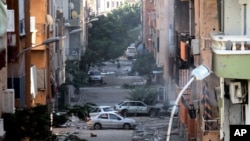A senior Libyan official is appealing to the international community not to tie humanitarian aid to his country’s political process. He warns the health needs of the Libyan people cannot wait until a government of national unity is formed.
Libya has been in a perpetual state of war since its people took up arms in 2011 to oust dictator Moammar Gadhafi.
Libya’s health minister, Reida El Oakley, warns his country’s health system is near collapse. He says up to 70 percent of the hospitals are shut down or dysfunctional.
El Oakley says 80 percent of Libya’s highly skilled medical staff was composed of foreign expatriates who left the country. He says the economy is in shambles because Libya is exporting very little oil, once its main money-earner. He says people are unable to obtain the health services they desperately need because of the lack of money.
El Oakley says the international community is reluctant to provide humanitarian aid to Libya because the country’s two competing administrations cannot agree on a government of national unity. He tells VOA this linkage is hurting Libya’s health system and the poor patients who cannot receive treatment for their illnesses.
“I think the international community, including the U.N., should divorce humanitarian need of Libyan people away from any political dialogue," he said. "Anything short of that, I would consider to be a crime…A similar thing is happening in Syria today where people are dying of hunger simply awaiting a conclusion of a political dialogue.”
Vulnerable Population
The World Health Organization reports nearly half of Libya’s population of 6.3 million is vulnerable and in need of humanitarian assistance. Of this number, it says 1.9 million are in need of health services.
The WHO representative in Libya, Jaffar Hussain, says most of these people are unable to get even the most basic primary health care. He says the international community cannot afford to ignore their difficult circumstances.
“Complacency would lead to much more serious consequences, and we will end up with massive outbreaks. We will end up with mortality and morbidity rates rising exponentially and we will end up compromising the health and the future of the people of Libya, if we do not act now,” he said.
WHO reports Libya is at increased risk of communicable diseases, including tuberculosis, malaria, and HIV-AIDS as a result of large numbers of migrants, many from sub-Saharan Africa, and a collapsed surveillance system.













